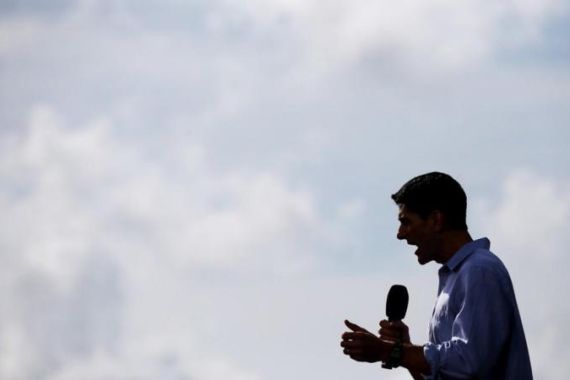Saving ‘Lyin’ Ryan’
Will the media have enough mettle to call out Paul Ryan on his campaign of blatant lies?

No doubt about it, Paul Ryan’s acceptance speech at the Republican National Convention the other night was a daring display, especially for a guy with his last name. If Ryan keeps spouting so many blatant and easily checkable lies, the temptation to comedy show and newspaper headline writers will be too much for frail mortals to bear: The Republican vice presidential nominee may soon find himself branded “Lyin’ Ryan”.
Unfortunately for the Wisconsin congressman, the phrase “Lyin’ Ryan” is a copywriter’s dream. It’s short and it rhymes, which makes it both catchy and memorable. And judging from Ryan’s record of not letting the facts get in the way of the story he wants to sell, the phrase also captures something essential about the candidate.
Shading the truth is one thing; politicians of all stripes do that all the time. But Ryan’s speech to the Republican faithful abused the truth so shamelessly that even mainstream media voices took notice in their post-speech coverage.
|
|
| US Vice-Presidential candidate Paul Ryan speaks at the RNC |
Speaking on MSNBC, commentator Eugene Robinson seemed to admire Ryan’s chutzpah, if not his honesty, remarking that it took real nerve to blame President Obama for the closure of an auto plant in Ryan’s hometown of Janesville, Wisconsin, when in fact that plant was closed before Obama was inaugurated, as people in Janesville must know perfectly well.
At the Washington Post, Johnathan Bernstein called out Ryan’s “staggering, staggering lie” about the federal deficit. Ryan, noted Bernstein, said the following about Obama: “He created a bipartisan debt commission. They came back with an urgent report. He thanked them, sent them on their way, and then did exactly nothing.”
Mincing no words, Bernstein argued that Ryan had lied even in his use of pronouns, explaining:
“‘They’. ‘Them’. ‘Them’. Those words are lies. Because Paul Ryan was on that commission. ‘Came back with an urgent report.’ That is a lie. The commission never made any recommendations for Barack Obama to support or oppose. Why not? Because the commission voted down its own recommendations. Why? Because Paul Ryan, a member of the commission, voted it down and successfully convinced the other House Republicans on the commission to vote it down.”
At Newsweek/DailyBeast, political correspondent Michael Tomasky wrote that it “just boggles the mind” to see a vice-presidential candidate stand up in front of the entire country and its press corps, and tell obvious lies. He cites in particular Ryan’s denunciation of Obama for supposedly de-funding Medicare by $716bn, when those $716bn are in fact withheld not from recipients but from insurance companies and – more to the point – Ryan’s own budget plan does exactly the same thing. Again, the chutzpah is breathtaking.
But Tomasky sees trouble ahead, predicting that Ryan’s ability to “‘spin the goods’ like nobody’s business… [will] put new pressure on the Democrats”. No previous presidential campaign has been so willing not just to bend the truth but break it, Tomasky argued, adding, “He’s practically saying to the Democrats and the media, ‘F*** you, come and get me. You can’t touch me’.”
Oh, but they can. For the media collectively exercise perhaps the greatest power there is in politics: Defining what is and isn’t reality. The question now is whether they have to stomach to tell the truth about Ryan’s lies.
It’s up to Ryan’s political opponents to take the lead, and doing so with a sense of humour would be smart. “There goes Lyin’ Ryan again,” Democrats could argue, adapting a phrase Ronald Reagan used to great effect during his 1984 re-election campaign against Democrat Walter Mondale. Or, riffing off the Steven Spielberg movie, how about a 30 second TV add about “Saving Lyin’ Ryan From His Attacks on Truth”?
Thus far, most of the mainstream media have stuck with their usual posture of “on the one hand Republicans say x, on the other hand Democrats say y, and both sides are guilty”. On CNN, for example, Reagan’s former White House press officer David Gergen dismissed Ryan’s serial falsehoods as mere “misstatements” in what Gergen insisted was actually “a speech about big ideas”.
Nevertheless, a brave few news organisations have demonstrated how to report on politicians’ falsehoods without succumbing to either partisanship or unprofessionalism. “Rick Santorum Repeats Inaccurate Welfare Attack on Obama,” reads the headline of David Lauter’s August 28 piece for the Los Angeles Times. (Like Mitt Romney before him, Santorum claimed in his speech to the convention that Obama had waived the work requirement in the federal welfare reform bill. Lauter explained that Obama did not waive the requirement, only notify states about new ways to fulfill it.)
The question, as Greg Mitchell has argued in his Nation blog, is whether the media as a whole will stand up for truth and, equally important, whether it will eventually get tired of pointing out such inaccuracies and enduring the inevitable accusations of liberal bias. Journalists faced a similar challenge while covering Reagan, who frequently made statements that were false, unproven or otherwise dubious. Uncomfortable with contradicting a man they believed (wrongly) was wildly popular with the public, most news organisations ended up giving Reagan a pass.
Will they do the same with Lyin’ Ryan?
Mark Hertsgaard, a Fellow of the New American Foundation, is the author of six books, including On Bended Knee: The Press and the Reagan Presidency and HOT: Living Through the Next Fifty Years on Earth.
